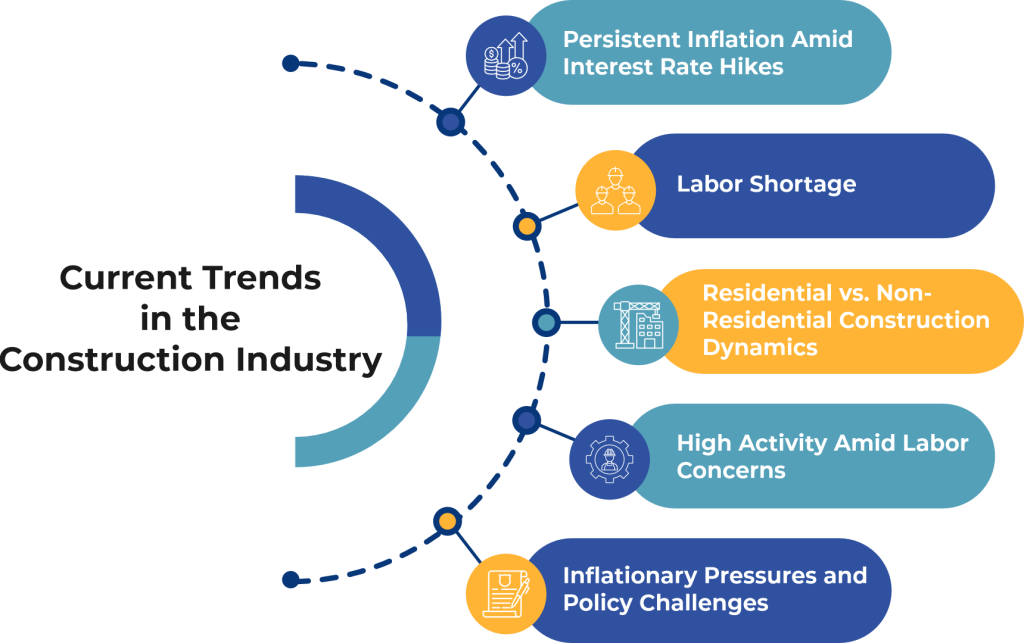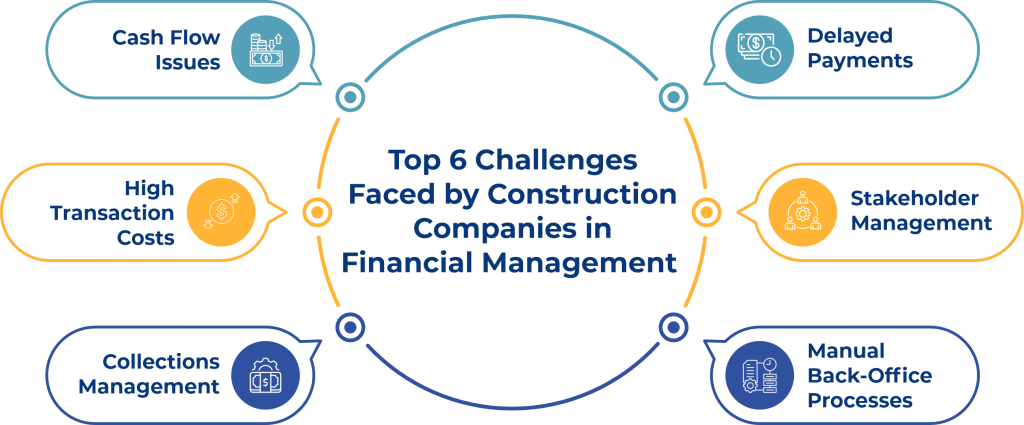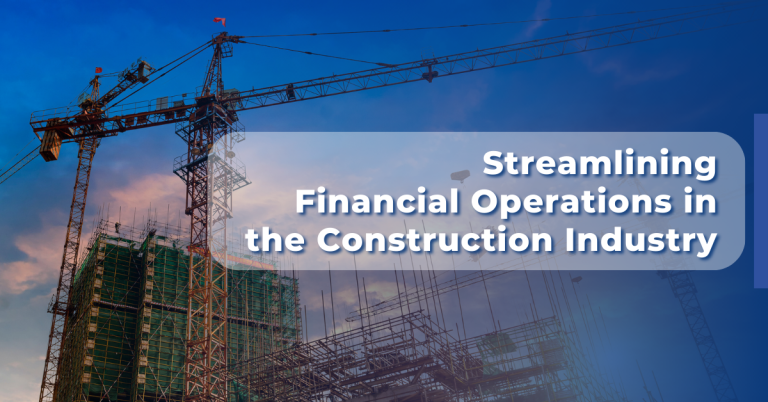Introduction

Source: Next Move Strategy Consulting
The construction industry has been vital to the global economy for years. In 2024, the US Construction industry is expected to have the most significant increase in employment than any other sector, adding 790,400 jobs. However, the industry has faced severe challenges in working capital management, particularly exacerbated by the breakneck inflation rates. Several finance automation solutions have emerged as viable options to address these challenges and help construction companies better manage their resources.
This blog focuses on the impact of financial management challenges on construction companies and explores the potential avenue of investment in technological solutions to overcome these roadblocks.
Current Trends in the Construction Industry
The critical issues and trends facing today’s construction industry highlight the interplay between labor market dynamics, sector-specific inflation, and the broader economic policies of the Federal Reserve.

1. Persistent Inflation Amid Interest Rate Hikes
Even with the Federal Reserve’s significant interest rate hikes, from nearly zero at the start of the year to a range of 5.25% to 5.0% by year-end, the construction industry continues to fuel inflation. Construction companies that work on fixed prices are most likely to suffer from inflation as they often lose projects because of incompetence in covering the costs of the additional raw materials. While the surge in mortgage rates dampens the pace of single-family housing construction in the US, other sectors within the industry remain active and inflationary. For instance, apartment construction is booming, with 934,000 units underway, marking the highest number since 1973, alongside ongoing non-residential projects.
2. Labor Shortage
The most critical issue for the construction industry is the inadequate supply of skilled workers. It leads to a significant wage increase (6.1% rise in 2021-2022) compared to the average wages across all industries (4.6%). The scarcity of labor is not only driving up operational expenses but also fueling persistent inflation within specific sectors.
3. Residential vs. Non-Residential Construction Dynamics
In contrast to the downturn in residential construction, especially single-family homes, non-residential construction is thriving. Robust construction activity is evident in hospitals, roads, and manufacturing plants. It is partly due to the sector’s resilience to the Federal Reserve’s policies, possibly due to access to alternative financing sources such as government or corporate funds.
4. High Activity Amid Labor Concerns
The construction industry foresees a busy 2024 ahead, particularly with promising growth in healthcare, data-service facilities, and infrastructure. However, skilled labor availability is a significant concern in this situation, mainly due to the $1.2 trillion allocated to federal spending in the next five years as per the Infrastructure Investment and Jobs Act of 2022, which is projected to intensify worker demand.
5. Inflationary Pressures and Policy Challenges
The construction industry’s ongoing dynamics of the labor market, encompassing the existing labor shortage and the expected increase in demand for skilled workers, continue to exert inflationary pressures. It presents a complex challenge for the Federal Reserve, requiring thoughtful consideration and the creation of sector-specific measures and policies to tackle the persistent inflation in the construction industry while maintaining a delicate balance for overall economic stability.
Challenges Faced by Construction Companies in Financial Management
Construction companies face unique financial management challenges like cash flow issues, stakeholder management issues, and high transaction costs. If left unchecked, these issues result in significant financial strain on the business, especially for small and mid-sized companies.

1. Cash Flow Issues
Construction projects often require a significant upfront investment, and if the company cannot generate sufficient revenue during the project to cover that cost, it struggles with cash flow issues. In addition, payment delays from clients or subcontractors can also lead to a cash flow crunch for construction companies.
2. Delayed Payments
Payment delays are common in the construction industry, with payment terms extending beyond the project’s completion. These delays can make it difficult for construction companies to manage their working capital effectively and meet their financial obligations.
3. High Transaction Costs
The construction industry involves a lot of paperwork and manual processes, which are time-consuming and costly. Invoicing, payment processing, and other financial transactions can incur high transaction costs, impacting the business’s profitability.
4. Stakeholder Management
Every construction project involves multiple stakeholders, including clients, subcontractors, suppliers, and lenders. Managing these stakeholders’ financial relationships is complex, requiring high financial expertise and significant resources.
5. Collections Management
Businesses involved in construction often face collection challenges, such as high Days Sales Outstanding (DSO) and paper check payments. High DSO can impact cash flow and hinder a company’s ability to invest in growth. Paper check payments can also be slow and time-consuming to process.
6. Manual Back-Office Processes
While the construction industry has invested in machinery automation, many small and mid-sized companies still have manual back-office processes, like accounting. This process can be time-consuming and inefficient, prone to errors and inconsistencies.
Overcoming Roadblocks of the Construction Industry with Financial Technology Solutions
Cutting-edge financial technologies offer various ways to address the challenges of working capital management that construction companies face, encompassing diverse solutions, each catering to specific business requirements:
- Accounts Receivable Automation Solutions
Automating AR functions is the first and most vital step for construction companies to manage their working capital effectively. These solutions integrate with existing ERP to streamline the invoicing, collections management, payment processing and deductions management processes. It provides real-time updates for tracking and managing customer payments. AR automation solutions accelerate cash inflows and minimize process delays, contributing to improved financial management.
- Accounts Payable Automation Solutions
Accounts Payable automation solutions transform financial management by digitizing Purchase Order (PO) delivery, real-time invoice processing, and automated pay-outs. These solutions help reduce invoicing processing costs, minimize errors, and accelerate AP workflow. It enhances efficiency and accuracy, providing businesses with a streamlined accounts payable process.
- Digital Payment Platforms
Digital Payment Platforms offer fast and secure payment processing, reducing delays and improving cash flow management. It enhances the customers’ payment experience and empowers them to pay anytime, anywhere with mobile apps.
- Enterprise Resource Planning (ERP)
ERP software helps construction companies manage complex financial structures and improve their financial management. Construction-specific ERP software is gaining popularity due to its industry-specific capabilities. These solutions can automate accounting and financial processes, reduce costs, and enhance cash flow management, helping construction companies achieve long-term success.
- Channel Financing
Channel financing platforms offer quick and easy access to capital for construction companies, which is particularly beneficial for small and mid-sized businesses. Additionally, these solutions provide early payment options to suppliers, reducing their reliance on expensive short-term financing options. It improves suppliers’ cash flow management and strengthens the relationships between buyers and suppliers.
Concrete Conclusion: Finance Automation is Driving the Change
The construction industry’s future is digital, and finance automation solutions are leading the way. Fintech companies are partnering with construction firms to offer innovative solutions and services that address the unique challenges faced by the industry. By embracing finance automation, construction companies can improve their working capital management, reduce payment delays, and improve their businesses’ overall profitability and growth.
At Global PayEX, we help construction companies streamline AR and AP management with our AI-powered product suite. Talk to our experts to learn more about how our automation solutions can transform your business’s financial management.



























